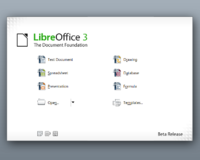
It's reflected in the personalities of Richard Stallman and Eric Raymond. Stallman's politics are leftist, Raymond's are conservative. This is reflected in the nature of the licenses they support. Stallman's “fourth freedom,” embodied in the GPL, is that you are free to get code improvements. Raymond's, embodied in BSD-like licenses of all types, is that you're free to make money from code.
You can think of Stallman as Catholic and Raymond as Protestant if you want, but their divide goes beyond mere licensing, into the nature of the open source process itself.
Apache's assertion of OpenOffice as an Apache podlink illustrates the problem, one I think Oracle CEO Larry Ellison set up deliberately in his treatment of the code. True code believers had long ago set up The Document Foundation under the banner of LibreOffice, which has an LGPL license. But Apache has agreed to use its own BSD-like Apache license for its version of the code, and asserts that it has money, and talent, needed to drive the code forward.

This illustrates the weakness of Raymond's model far better than a license difference ever could. A corporate-funded project is subject to the vagaries of corporate ambitions. Even if you're running corporate contributions through a foundation, whether Apache or Eclipse, they're still corporate contributions. They're based, not on the strength of the software, not on the community's use of it, but on the decisions of corporate funders.
Advantage, Stallman.
At the end of the day, we really are talking about a political choice between public and private here. And the weaknesses inherent in both models. A private model is driven by private concerns, while a public model is subject to political difference.
Which works best? The jury is still out, but the fate of this code base will tell us a lot about that.










payday loans
Dana Blankenhorn: Political Lines Harden Between Open Source and FOSS
payday loans
Dana Blankenhorn: Political Lines Harden Between Open Source and FOSS